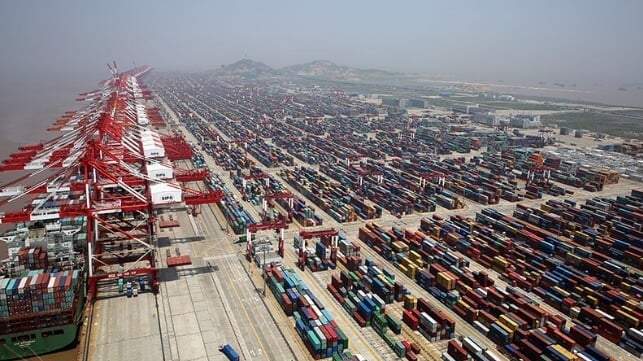IMF: Trump's Tariffs Could Slow Global Trade Growth by Half in 2025

Global trade volume and global economic growth will both be reduced if new U.S. tariff policies continue on their current course, according to the International Monetary Fund's latest World Economic Outlook forecast.
Compared to its last update in January, the IMF has cut back its 2025 trade growth forecast by half, from an expected 3.2 percent down to 1.7 percent. It also pared back its economic growth forecast from 3.3 percent in 2024 to 2.8 percent in 2025 - a global slowdown, but not a recession. IMF predicts that the most affected OECD country will be the nation at the center of the tariff negotiations: the United States, which will see growth for 2025 reduced by half (from 1.8 percent down to 0.9 percent).
However, the IMF's forecast assumes that the Trump administration holds course on its current tariff plans, including the "reciprocal" tariff list affecting most foreign trade partners. That prediction appears uncertain, and the White House has repeatedly changed its position on what the final bundle of tariffs should look like after all talks are completed.
On Tuesday, following Monday's sharp selloff in the U.S. markets, Treasury Secretary Scott Bessent told a private meeting of JP Morgan investors that the growing trade war with China is "unsustainable." Trump's 145 percent top tariff rate on Chinese goods is the steepest on any U.S. trading partner, and China has imposed a retaliatory tariff of 125 percent.
Bessent predicted that these tariff tensions would de-escalate in the "very near future," even though formal talks with Beijing have not started. Immediately after his closed-door comments, public markets soared, and the Dow recovered Monday's losses by the close of trading Tuesday.
Separately, White House press secretary Karoline Leavitt told reporters on Tuesday that the administration is already reviewing 18 trade proposals, and there will be trade meetings with 34 other countries this week alone. She confirmed that as of yet, there have been no formal talks between President Donald Trump and Chinese President Xi Jinping on tariffs.
“We're going to be very nice [with China]. They're going to be very nice. And we'll see what happens," Trump said Tuesday. "But ultimately, they have to make a deal because otherwise they're not going to be able to deal in the United States."
Trump also suggested that he is not going to "play hardball" with China, despite his longstanding complaints that Chinese industrial policies have "ripped off" America.

that matters most
Get the latest maritime news delivered to your inbox daily.
Trump's plan for one-on-one, nation-by-nation dealmaking has an additional challenge: China has threatened anyone who sits down to talk with the White House if the outcome is bad for Beijing.
"China firmly opposes any party reaching a deal at the expense of China’s interests," the nation's commerce ministry said in a statement. "For one’s own temporary selfish interests, sacrificing the interests of others in exchange for so-called exemptions is like seeking the skin from a tiger. It will ultimately only fail on both ends and harm others without benefiting themselves."
